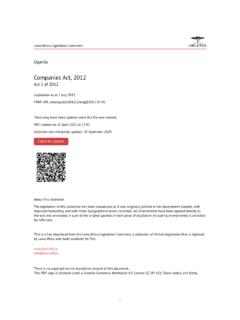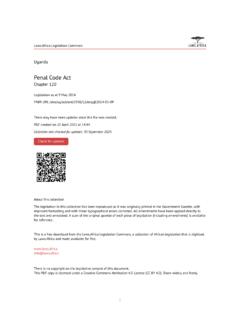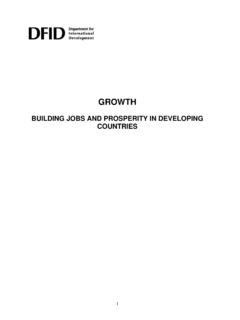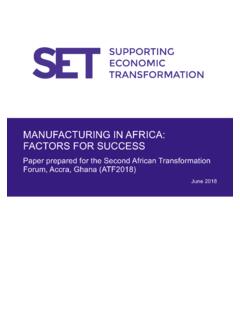Transcription of Employment Act, 2006
1 Legislation CommonsUgandaEmployment Act, 2006 Act 6 of 2006 Legislation as at 8 June 2006 FRBR URI: /akn/ug/act/2006/6/eng@2006-06-08 There may have been updates since this file was created on 20 April 2022 at 14 last checked for updates: 30 September for updatesAbout this collectionThe legislation in this collection has been reproduced as it was originally printed in the Government Gazette, withimproved formatting and with minor typographical errors corrected. All amendments have been applied directly tothe text and annotated. A scan of the original gazette of each piece of legislation (including amendments) is availablefor reference. This is a free download from the Legislation Commons, a collection of African legislation that is digitisedby and made available for is no copyright on the legislative content of this PDF copy is licensed under a Creative Commons Attribution License (CC BY ).
2 Share widely and Act, 2006 ContentsPart I Preliminary .. 11. Commencement .. 12. Interpretation .. 13. Application of the Act .. 34. Provisions in agreement .. 4 Part II General principles .. 45. Forced labour .. 46. Discrimination in Employment .. 47. Sexual harassment in Employment .. 5 Part III Administration and jurisdiction .. 58. Labour to administer the Act .. 59. Appointment of officers .. 610. Labour inspection .. 611. Powers of labour officer .. 612. Settlement of grievances .. 713. Labour officer s power to investigate and dispose of complaints .. 714. Labour officer s power to prosecute .. 815. Obstruction of officers .. 816. Criminal offences .. 817. Conflict of interest .. 818. A labour officer not to reveal trade secrets .. 819. Returns and statistics .. 920. Annual report .. 921. Labour Advisory Board .. 922.
3 Functions of Board .. 10 Part IV The Employment relationship .. 1023. General .. 1024. Continuation of contracts in force .. 1025. Oral and written contracts .. 1026. Attestation .. 1127. Variation or exclusion of provisions of the Act .. 1128. Transfer of contract .. 1129. Death of employer .. 1130. Insolvency of employer .. 11ii31. Inability to pay wages .. 1232. Employment of children .. 1233. Medical examinations .. 1234. Special categories of employees .. 1335. Notification of vacancies .. 1336. Departure from uganda .. 1337. Migrant workers .. 1338. Recruitment permit .. 1339. Repatriation .. 14 Part V Wages and related notices .. 1440. Duty of employer to provide work .. 1441. Entitlement to wages .. 1542. Death of an employee .. 1643. Payment of wages .. 1644. Payment of wages to another .. 1645. Prohibition on certain deductions.
4 1746. Permitted deductions .. 1747. Repayment .. 1748. Preferential claims .. 1749. Union dues .. 1850. Pay statements .. 18 Part VI Rights and duties in Employment .. 1951. Weekly rest .. 1952. Pay calculation .. 1953. Length of working hours per week .. 1954. Annual leave and public holidays .. 2055. Sick pay .. 2056. Maternity leave .. 2157. Paternity leave .. 2158. Notice periods .. 2159. Written particulars .. 2260. Written particulars to act as evidence .. 2361. Certificate of service .. 23 Part VII Discipline and termination .. 2462. Disciplinary penalties .. 24iii63. Suspension .. 2464. Complaint by employee .. 2465. Termination .. 2566. Notification and hearing before termination .. 2667. Probationary contracts .. 2668. Proof of reason for termination .. 2669. Summary termination .. 2770. Complaint to labour officer in cases of summary dismissal.
5 2771. Unfair termination .. 2772. Representation .. 2873. Criteria for unfair termination .. 2874. Role of employees .. 2975. Reasons for termination or discipline .. 2976. Industrial action .. 2977. Remedies for unfair termination .. 2978. Compensatory order .. 2979. Calculation of a week s wages .. 3080. Settlement of termination cases .. 3081. Collective terminations .. 31 Part VIII Continuity of Employment .. 3182. Basis of continuity .. 3183. Definition of continuous service .. 3184. Continuity of Employment .. 3185. Treatment of periods .. 3286. Seasonal Employment .. 32 Part IX Severance allowance .. 3287. When severance allowance is due .. 3288. No severance allowance under summary dismissal .. 3389. Calculation of amount of severance allowance .. 3390. Bonus and other payments .. 3391. Payment of severance allowance .. 3492.
6 Failure to pay severance allowance .. 34 Part X Remedies, jurisdiction and appeals .. 3493. Jurisdiction over claims; remedies .. 3494. Appeals .. 35ivPart XI Miscellaneous .. 3595. Criminal liability .. 3596. Penalties .. 3597. Regulations .. 3598. Repeal .. 3699. Savings .. 36100. Transitional .. 36 Schedule 1 .. 37 Schedule 2 (Section 2) .. 39vviEmployment Act, 2006 UgandaUgandaEmployment Act, 2006 Act 6 of 2006 Published in uganda Gazette no. 36 on 8 June 2006 Assented to on 24 May 2006 Commenced on 7 August 2006 by Statutory Instrument 33 of 2006[This is the version of this document from 8 June 2006 andincludes any amendments published up to 30 September 2020.]An Act to revise and consolidate the laws governing individual Employment relationships, and to providefor other connected IT ENACTED by Parliament as follows:Part I Act shall come into force on a date to be appointed by the Minister by statutory this Act, unless the context otherwise requires affiliated union means any Labour Union affiliated to a Federation of Labour Unions; business includes any trade, profession, undertaking, operation or establishment, whether public, co-operative or private; casual employee means a person who works on a daily or hourly basis where payment of wages is dueat the completion of each day s work; child means a person below the age of eighteen years; Commissioner means the Commissioner in the Ministry responsible for labour.
7 Continuous service means an employee s service with the same employer as defined in Part VIII; contract of apprenticeship means a contract of service (a)where there is an obligation on the employer to take all reasonable steps to ensure that theemployee is taught, and acquires, the knowledge and skills of that industry, by means of practicaltraining received in the course of the employee s Employment ; and(b)where there is a provision for formal recognition of the fact that the employee has acquired theknowledge and skills, intended to be acquired when the employee has done so; contract of service means any contract, whether oral or in writing, whether express or implied,where a person agrees in return for remuneration, to work for an employer and includes a contract ofapprenticeship; currency point means the value specified in relation to currency point in Schedule 2; dependent relative means a member of an employee s family who substantially depends on thatemployee for his or her livelihood;By and contributors.
8 Licensed under CC-BY. Share widely and Act, 2006 uganda disability means any permanent (a)physical disability or impairment;(b)physical illness;(c)psychiatric illness;(d)intellectual or psychological disability or impairment;(e)loss or abnormality of physiological, psychological or anatomical structural function;(f) reliance on a guide dog, wheelchair, or any other remedial means; and(g)presence in the body of organisms capable of causing illness; Disciplinary Code means the code set out in Schedule 1; dismissal from Employment means the discharge of an employee from Employment at the initiativeof his or her employer when the said employee has committed verifiable misconduct; employee means any person who has entered into a contract of service or an apprenticeship contract,including, without limitation, any person who is employed by or for the Government of uganda , includingthe uganda Public Service, a local authority or a parastatal organisation but excludes a member of theUganda Peoples Defence Forces.
9 Employer means any person or group of persons, including a company or corporation, a public,regional or local authority, a governing body of an unincorporated association, a partnership, parastatalorganisation or other institution or organisation whatsoever, for whom an employee works or has worked,or normally worked or sought to work, under a contract of service, and includes the heirs, successors,assignees and, transferors of any person or group of persons for whom an employee works, has worked, ornormally works; forced and compulsory labour means all work or service which is extracted from any person underthe threat of a penalty, including the threat of any loss of rights or privileges and for which that personhas not offered himself or herself voluntarily; HIV means Human Immune-Deficiency Virus; Industrial Court means the Industrial Court established by the Trade Disputes (Arbitration andSettlement) Act, 2006; labour officer means the Commissioner or a District Labour officer; labour union means a labour union registered under the Labour Unions Act, 2006; light work means work that is not physically, mentally, and socially injurious to the child; migrant worker means a person who migrates or has migrated from one country to another witha view to being employed by another person and includes any person regularly admitted as a migrantworker; mine means any undertaking, whether public or private, for the extraction of any substance from on orunder the surface of the earth by means involving the Employment of persons underground; Minister means the Minister responsible for labour matters.
10 Pay period means the relevant period, whether of a day, week, fortnight or month by reference towhich an employee is entitled to receive his or her wages; parties means the parties to a contract of service; President means the President of uganda ;By and contributors. Licensed under CC-BY. Share widely and Act, 2006 uganda probationary contract means a contract of Employment , which is not of more than six monthsduration, is in writing and expressly states that it is for a probationary period; public service means service by or for the Government of uganda and includes persons employed inthe public service, parastatal organisations and local authorities, but does not include a member of theUganda Peoples Defence Forces; qualified medical practitioner means a Government medical officer or a registered medicalpractitioner; recruitment includes all operations undertaken with the object of obtaining or supplying the labour ofpersons who do not continuously offer their services at the place of Employment ; regulations means regulations made under section 97.










